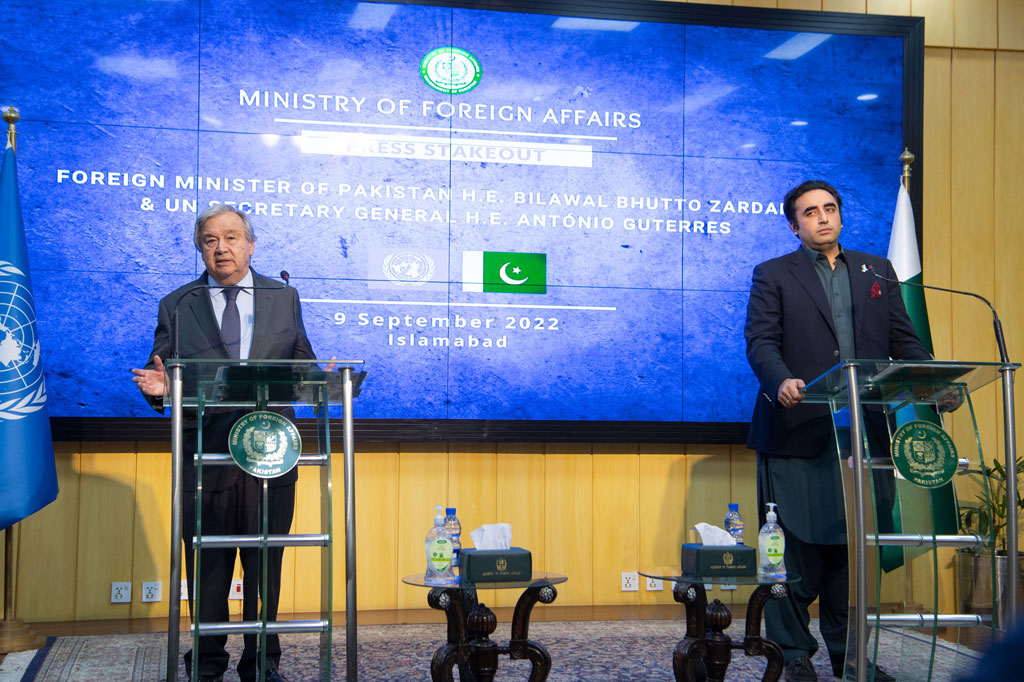Ladies and gentlemen of the media, good afternoon.
I’m here to express my deep solidarity with the Pakistani people over the devastating loss of life, human suffering and physical damage caused by this year’s floods. A problem of the densification of climate change.
Today, I was briefed by Prime Minister Sharif, Foreign Minister Bhutto, and other senior members of the government on the latest developments.
Some regions of Pakistan have just experienced their wettest August on record. And rainfall in some provinces was up to eight times higher than usual. Climate change is there.
Tomorrow, I will see the impact of the floods in different areas of the country.
But we have all seen media images of the extraordinary destruction. I can only imagine the power and ferocity of the water as it bore down on villages, roads, bridges and everything else in its path. It was clearly terrifying – a wall of water.
My heart goes out to everyone who has lost loved ones in this tragedy, and all those who have been affected by the loss of their homes, their businesses and their livelihoods.
I visited Pakistan many times when I was High Commissioner for Refugees. Pakistan hosts one of the most effective and generous refugee operations of the world, in support of millions of Afghans.
So, this is not my first visit to Pakistan. I have a love affair with the Pakistani people for 17 years. I was, in 2005, talking to the victims of the earthquake. I remember the devastation of floods in 2010. And I remember being with displaced people when you had these terrorist attacks going down in the Swat Valley and coming close to Islamabad, and seeing how dramatic their situation is. And, many times, in Balochistan, in Khyber Pakhtunkhwa, I saw how [Pakistani] communities would generously host Afghan refugees. And one thing I have always discovered in Pakistan, was the way people would support other people. Pakistanis or Afghans, communities would support other communities with an enormous sense of generosity and solidarity.
And so, it is very emotional for me to see the level of suffering that so many Pakistanis are having at the present moment. Because it is heartbreaking to see such a generous people going through this crisis.
No country deserves this fate, but particularly not countries like Pakistan that have done almost nothing to contribute to global warming.
Pakistan and other developing countries, from the Horn of Africa to the Sahel, are paying a horrific price for the intransigence of big emitters that continue to bet on fossil fuels, in the face of science, common sense and basic human decency.
Even today, emissions are rising as people die in floods and famines.
This is insanity. This is collective suicide.
From Pakistan, I am issuing a global appeal: stop the madness; end the war with nature; invest in renewable energy now.
And as the crisis gathers pace, it’s clear that most countries are nowhere near prepared.
Developed countries must step up and provide Pakistan and other countries on the frontlines with the financial and technical resources they need to survive extreme weather events like these deadly floods.
Half of all climate finance must go to adaptation and resilience in the developing world. Developed countries must produce a credible roadmap to back their commitment to double their financial support.
Loss and damage from the climate crisis is not a future event. It is happening now, all around us. I urge governments to address this issue at COP 27 with the seriousness it deserves.
Ladies and gentlemen of the media,
The United Nations is on the ground to support the Pakistani government’s relief efforts. We and the civil society are making good use of the funds released from the UN’s Central Emergency Response Fund, and we are stepping up our efforts through an air bridge from Dubai.
Our people have delivered food or cash assistance to hundreds of thousands of people in Balochistan and Sindh, tons of emergency supplies to support children and women. But let’s be clear, what we have done is a drop in the ocean of the needs of the Pakistani people.
Hundreds of thousands of displaced people are living in camps, and many more – 6 million, as far as I know, are with host communities, that are sharing everything with them.
An important reason for my visit is to draw the attention of the international community to this climate catastrophe, and to appeal for massive support. Pakistan needs massive financial support for the relief and then, for the recovery.
And, as I said this morning – and I repeat- this is not a matter of solidarity or generosity; it is a matter of justice.
Before I conclude, allow me to say a few words about the passing of Her Majesty Queen Elizabeth the Second.
On behalf of the United Nations, I extend my sincere condolences to the Queen’s family and to the people of the United Kingdom and the wider Commonwealth.
Queen Elizabeth exemplified the values of calmness, dignity, and grace. For as long as I can remember, she has been a reassuring presence on the global stage.
Thank you.

